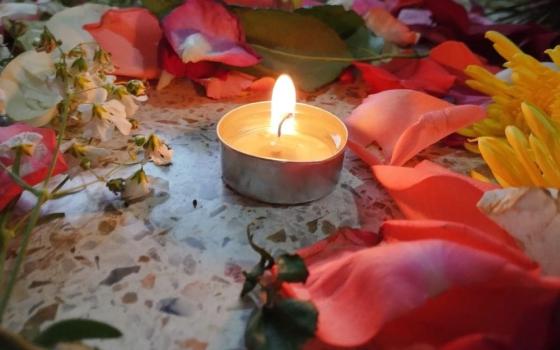
Grail Sr. Rose Mmbaga, second from left, walks with some Maasai women who are gathering wood to fuel cooking fires. (Provided photo)
As a Grail sister of Tanzania I have had the privilege of ministering in the Maasai community of northern Tanzania, East Africa for many years. We started by educating the Maasai women, and as we lived with them and shared their lifestyle, we gradually learned what their special needs were and what we needed to do. For example, we have started feeding the Maasai children to reduce malnutrition and kwashiorkor due to lack of proper food and treatment.
The Maasai are semi-nomadic herders, who depend on their livestock for wealth, and the milk, meat and blood they provide. Their colorful traditions, customs and dress, and the fact they live near East African national game parks have made them well known among Kenyan indigenous ethnic groups. Most of them are either Catholic or Lutheran. Maasai women respect God, regularly meeting for small community every Sunday and Wednesday and for preparation of song for Sunday.
Presently there are a number of serious issues in Maasai society. For example, our Maasai girls — not just our students but the girls in primary school or younger — are being forced into early marriages. Sister Samba explained to me that the parents want them to get married in order to get their dowry. The dowry comes in the form of cows; in Maasai culture, the more cows you own, the higher your prestige.
Advertisement
Another serious issue is Female Genital Mutilation (FGM). Sister Deonisia tells us about this. It is a cultural initiation ceremony in which a number of young girls are circumcised. There are many negative consequences to their health, even death from heavy bleeding. Circumcision is a door to early marriage since most are married after the FGM ceremony.
We have kept records, and out of 389 girls we know that received FGM, 146 got married during this COVID-19 "holiday." We have been working hard to get them back to school, and also we are fighting for the younger girls to get into primary school.
In struggling to get girls back to school, we make use of the police force to catch the parents, on the basis that they are neglecting the rights of their children to acquire an education. Most of the girls who are involved are between the ages of 6 to 13 years old.
Right now, the cases of girl students who were married during the COVID-19 crisis are now at the police court for judgement.
How can these girls be helped? I think the most important ways are:
- Girls (students) need to be supported materially with uniforms and learning materials like exercise books, pens and pencils.
- They need help with school fees to help them learn without worry.
- We need to provide these girls with a dormitory because of the long distance from home to school; many girls have been raped on the way to school and have become pregnant.
- Security is important when students are at school.
- Parents need to be trained through seminars on the importance of a child's rights to education.
Early marriages and FGM have led Maasai women to bring their girls to our convent in order to save the girls from these practices. As a result, we have started a center for Maasai girls. We have rescued them from FGM and fistula, (often a result of early-age childbirth) and have reduced the rate of death. A good number of Maasai girls have enrolled in the school. We have been so successful that our center for Maasai girls is now too small for the number of girls we serve, and we are trying to get a grant to make it bigger.

Women of the Kwakihindi Maasai community do the family laundry. (Rose Mmbaga)
Freedom of speech is also an issue for Maasai women. Most men exercise power over women's lives and personal freedoms; some women even have to get permission to go to town or visit friends.
Overworking is also a problem for Maasai women. In the Maasai community, women are responsible for maintaining the home, for cooking and cleaning, collecting firewood and water, looking after children, and building and repairing their huts.
It is obvious that married Maasai women have a workload that far exceeds that of married men. In a typical day, they clean their houses, cook, look after young babies, and fetch water. As there may be more than one wife in each household, the women share the workload among themselves and may delegate tasks to children and unmarried women in the homestead.
We Grail Sisters are working in more than seven villages, and the Maasai women, men, girls and children have become our friends. We share many things with them, and they tell us their likes and dislikes. They complain to us about some of their traditions: they don't like FGM or early marriages, and are trying to stop these bad traditions. We are there for them and look forward to helping them improve their lives.
[Rose Mmbaga is a Sister of the Grail of Tanzania. With a ministerial background in education, she first worked as a teacher, serving as academic mistress and assistant. She has carried that educational work over into her ministry with the Maasai people, coordinating the teacher resource center and offering seminars for teachers, pupils, and the Maasai community.]














